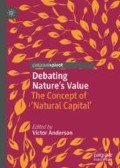Abstract
This chapter looks at the prominence of nature in applications of natural capital, focusing on the steps that the UK’s Natural Capital Committee has suggested for developing a long-term plan for investment in the environment. The chapter finds that there is a risk of losing sight of nature and focusing on delivering environmental goods and services to people.
Access this chapter
Tax calculation will be finalised at checkout
Purchases are for personal use only
Notes
- 1.
An independent advisory body to the UK government established in 2012.
- 2.
These goods and services are used directly by people (such as places for recreation) or as inputs to production processes, either in households (such as preparation of food) or businesses (such as production of timber). When the outputs are used or consumed, they provide benefits to people.
- 3.
The classes of assets used by the NCC [4] are species, ecological communities, soils, land, freshwater, coasts, oceans, atmosphere, minerals and subsoil assets.
- 4.
The categories of goods and services used by the NCC [3] are food, fibre, energy, clean water, clean air, recreation, aesthetics, wildlife, protection from hazards and equable climate.
- 5.
These measure economic growth in terms of gross domestic product, amongst other things.
- 6.
The NCC [5] suggests that private organisations should be responsible for maintaining the natural capital assets that they own in perpetuity with no loss in the assets. This builds on the concept that the current generation holds the management of natural capital in trust for future generations.
- 7.
The issues discussed in this section also apply to the appraisal of costs and benefits of specific options for investing in natural capital, which is a separate step identified by the NCC [5].
References
Bateman, I., B. Day, M. Agarwala, P. Bacon, T. Baďura, A. Binner, A. De-Gol, B. Ditchburn, S. Dugdale, B. Emmett, S. Ferrini, C. Carlo Fezzi, A. Harwood, J. Hillier, K. Hiscock, M. Hulme, B. Jackson, A. Lovett, E. Mackie, R. Matthews, A. Sen, G. Siriwardena, P. Smith, P. Snowdon, G. Sünnenberg, S. Vetter, and S. Vinjili. 2014. UK national ecosystem assessment follow-on. Work package report 3: Economic value of ecosystem services. UNEP-WCMC, LWEC, UK.
Mayer, C. 2013. Unnatural capital accounting. Paper for the Natural Capital Committee.
NCC. 2014. The state of natural capital: Restoring our natural assets. Second report to the Economic Affairs Committee.
NCC. 2014. Towards a framework for defining and measuring changes in natural capital. Working paper 1.
NCC. 2015. The state of natural capital: Protecting and improving natural capital for prosperity and wellbeing. Third report to the Economic Affairs Committee.
Author information
Authors and Affiliations
Corresponding author
Editor information
Editors and Affiliations
Rights and permissions
Copyright information
© 2018 The Author(s)
About this chapter
Cite this chapter
Clark, R. (2018). Natural Capital: The Risks of Losing Sight of Nature. In: Anderson, V. (eds) Debating Nature's Value. Palgrave Pivot, Cham. https://doi.org/10.1007/978-3-319-99244-0_8
Download citation
DOI: https://doi.org/10.1007/978-3-319-99244-0_8
Published:
Publisher Name: Palgrave Pivot, Cham
Print ISBN: 978-3-319-99243-3
Online ISBN: 978-3-319-99244-0
eBook Packages: Economics and FinanceEconomics and Finance (R0)

